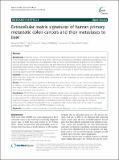Extracellular matrix signatures of human primary metastatic colon cancers and their metastases to liver
Author(s)
Naba, Alexandra; Clauser, Karl R.; Whittaker, Charles A.; Carr, Steven A.; Tanabe, Kenneth K.; Hynes, Richard O; ... Show more Show less
Download1471-2407-14-518.pdf (1.501Mb)
PUBLISHER_CC
Publisher with Creative Commons License
Creative Commons Attribution
Terms of use
Metadata
Show full item recordAbstract
Background:
Colorectal cancer is the third most frequently diagnosed cancer and the third cause of cancer deaths in the United States. Despite the fact that tumor cell-intrinsic mechanisms controlling colorectal carcinogenesis have been identified, novel prognostic and diagnostic tools as well as novel therapeutic strategies are still needed to monitor and target colon cancer progression. We and others have previously shown, using mouse models, that the extracellular matrix (ECM), a major component of the tumor microenvironment, is an important contributor to tumor progression. In order to identify candidate biomarkers, we sought to define ECM signatures of metastatic colorectal cancers and their metastases to the liver.
Methods:
We have used enrichment of extracellular matrix (ECM) from human patient samples and proteomics to define the ECM composition of primary colon carcinomas and their metastases to liver in comparison with normal colon and liver samples.
Results:
We show that robust signatures of ECM proteins characteristic of each tissue, normal and malignant, can be defined using relatively small samples from small numbers of patients. Comparisons with gene expression data from larger cohorts of patients confirm the association of subsets of the proteins identified by proteomic analysis with tumor progression and metastasis.
Conclusions:
The ECM protein signatures of metastatic primary colon carcinomas and metastases to liver defined in this study, offer promise for development of diagnostic and prognostic signatures of metastatic potential of colon tumors. The ECM proteins defined here represent candidate serological or tissue biomarkers and potential targets for imaging of occult metastases and residual or recurrent tumors and conceivably for therapies. Furthermore, the methods described here can be applied to other tumor types and can be used to investigate other questions such as the role of ECM in resistance to therapy.
Date issued
2014-07Department
Massachusetts Institute of Technology. Department of Biology; Koch Institute for Integrative Cancer Research at MITJournal
BMC Cancer
Publisher
BioMed Central Ltd.
Citation
Naba, Alexandra, Karl R. Clauser, Charles A. Whittaker, Steven A. Carr, Kenneth K. Tanabe, and Richard O. Hynes. "Extracellular matrix signatures of human primary metastatic colon cancers and their metastases to liver." BMC Cancer 2014, 14:518 (18 July 2014).
Version: Final published version
ISSN
1471-2407